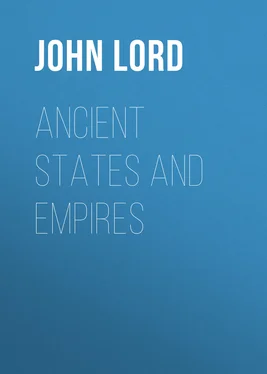John Lord - Ancient States and Empires
Здесь есть возможность читать онлайн «John Lord - Ancient States and Empires» — ознакомительный отрывок электронной книги совершенно бесплатно, а после прочтения отрывка купить полную версию. В некоторых случаях можно слушать аудио, скачать через торрент в формате fb2 и присутствует краткое содержание. Жанр: foreign_prose, История, foreign_edu, foreign_antique, на английском языке. Описание произведения, (предисловие) а так же отзывы посетителей доступны на портале библиотеки ЛибКат.
- Название:Ancient States and Empires
- Автор:
- Жанр:
- Год:неизвестен
- ISBN:нет данных
- Рейтинг книги:4 / 5. Голосов: 1
-
Избранное:Добавить в избранное
- Отзывы:
-
Ваша оценка:
- 80
- 1
- 2
- 3
- 4
- 5
Ancient States and Empires: краткое содержание, описание и аннотация
Предлагаем к чтению аннотацию, описание, краткое содержание или предисловие (зависит от того, что написал сам автор книги «Ancient States and Empires»). Если вы не нашли необходимую информацию о книге — напишите в комментариях, мы постараемся отыскать её.
Ancient States and Empires — читать онлайн ознакомительный отрывок
Ниже представлен текст книги, разбитый по страницам. Система сохранения места последней прочитанной страницы, позволяет с удобством читать онлайн бесплатно книгу «Ancient States and Empires», без необходимости каждый раз заново искать на чём Вы остановились. Поставьте закладку, и сможете в любой момент перейти на страницу, на которой закончили чтение.
Интервал:
Закладка:
The reign of the high priests. Their turbulent reigns. Popular tumults. Misery of the Jews.
It is difficult to trace, with any satisfaction, the internal government of the Jews during the two hundred years when the chief power was in the hands of the high priests—this period marked by the wars between Syria and Egypt, or rather between the successors of the generals of Alexander. The government of the high priests at Jerusalem was not exempt from those disgraceful outrages which occasionally have marked all the governments of the world—whether in the hands of kings, or in an oligarchy of nobles and priests. Nehemiah had expelled from Jerusalem, Manasseh, the son of Jehoiada, who succeeded Eliashib in the high priesthood, on account of his unlawful marriage with a stranger. Manasseh, invited to Samaria by the father of the woman he had married, became high priest of the temple on Mount Gerizim, and thus perpetuated the schism between the two nations. Before the conquests of Alexander, while the country was under the dominion of Persia, a high priest by the name of John murdered his brother Jesus within the precincts of the sanctuary, which crime was punished by the Persian governor, by a heavy fine imposed upon the whole nation. Jaddua was the high priest in the time of Alexander, and by his dignity and tact won over the conqueror of Asia. Onias succeeded Jaddua, and ruled for twenty-one years, and he was succeeded by Simon the Just, a pontiff on whose administration Jewish tradition dwells with delight. Simon was succeeded by his uncles, Eleazar and Manasseh, and they by Onias II., son of Simon, through whose misconduct, or indolence, in omitting the customary tribute to the Egyptian king, came near involving the country in fresh calamities—averted, however, by his nephew Joseph, who pacified the Egyptian court, and obtained the former generalship of the revenues of Judea, Samaria, and Phœnicia, which he enjoyed to the time of Antiochus the Great. Onias II. was succeeded by his son Simon, under whose pontificate the Egyptian monarch was prevented from entering the temple, and he by Onias III., under whose rule a feud took place with the sons of Joseph, disgraced by murders, which called for the interposition of the Syrian king, who then possessed Judea. Joshua, or Jason, by bribery, obtained the pontificate, but he allowed the temple worship to fall into disuse, and was even alienated from the Jewish faith by his intimacy with the Syrian court. He was outbidden in his high office by Onias, his brother, who was disgraced by savage passions, and who robbed the temple of its golden vessels. The people, indignant, rose in a tumult, and slew his brother, Lysimachus. Meanwhile, Jason, the dispossessed high priest, recovered his authority, and shut up Onias, or Menelaus, as he called himself, in a castle. This was interpreted by Antiochus as an insurrection, and he visited on Jerusalem a terrible penalty—slaughtering forty thousand of the people, and seizing as many more for slaves. He then abolished the temple services, seized all the sacred vessels, collected spoil to the amount of eighteen hundred talents, defiled the altar by the sacrifice of a sow, and suppressed every sign of Jewish independence. He meditated the complete extirpation of the Jewish religion, dismantled the capitol, harassed the country people, and inflicted unprecedented barbarities. The temple itself was dedicated to Jupiter Olympius, and the reluctant and miserable Jews were forced to join in all the rites of pagan worship, including the bacchanalia, which mocked the virtue of the older Romans.
The Maccabees. Mattathias. His successes.
From this degradation and slavery the Jews were rescued by a line of heroes whom God raised up—the Asmoneans, or Maccabees. The head of this heroic family was Mattathias, a man of priestly origin, living in the town of Modin, commanding a view of the sea—an old man of wealth and influence who refused to depart from the faith of his fathers, while most of the nation had relapsed into the paganism of the Greeks. He slew with his own hand an apostate Jew, who offered sacrifice to a pagan deity, and then killed the royal commissioner, Apelles, whom Antiochus had sent to enforce his edicts. The heroic old man, who resembled William Tell, in his mission and character, summoned his countrymen, who adhered to the old faith, and intrenched himself in the mountains, and headed a vigorous revolt against the Syrian power, even fighting on the Sabbath day. The ranks of the insurrectionists were gradually filled with those who were still zealous for the law, or inspired with patriotic desires for independence. Mattathias was prospered, making successful raids from his mountain fastnesses, destroying heathen altars, and punishing apostate Jews. Two sects joined his standard with peculiar ardor—the Zadikim, who observed the written law of Moses, from whom the Sadducees of later times sprang, and the more zealous and austere Chasidim, who added to the law the traditions of the elders, from whom the Pharisees came.
Old men are ill suited to conduct military expeditions when great fatigue and privation are required, and the aged Mattathias sank under the weight which he had so nobly supported, and bequeathed his power to Judas, the most valiant of his sons.
His son Judas. His heroic deeds.
This remarkable man, scarcely inferior to Joshua and David in military genius and heroic qualities, added prudence and discretion to personal bravery. When his followers had gained experience and courage by various gallant adventures, he led them openly against his enemies. The governor of Samaria, Apollonius, was the first whom he encountered, and whom he routed and slew. Seron, the deputy governor of Cœlesyria, sought to redeem the disgrace of the Syrian arms; but he also was defeated at the pass of Bethoron. At the urgent solicitation of Philip, governor of Jerusalem, Antiochus then sent a strong force of forty thousand foot and seven thousand horse to subdue the insurgents, under the command of Ptolemy Macron. Judas, to resist these forces, had six thousand men; but he relied on the God of Israel, as his fathers had done in the early ages of Jewish history, and in a sudden attack he totally routed a large detachment of the main army, under Gorgias, and spoiled their camp. He then defeated another force beyond the Jordan, and the general fled in the disguise of a slave, to Antioch. Thus closed a triumphant campaign.
Syria invades Palestine.
The next year, Lysias, the lieutenant-general of Antiochus, invaded Judea with a large force of sixty-five thousand men. Judas met it with ten thousand, and gained a brilliant victory, which proved decisive, and which led to the re-establishment of the Jewish power at Jerusalem. Judas fortified the city and the temple, and assumed the offensive, and recovered, one after another, the cities which had fallen under the dominion of Syria. In the mean time, Antiochus, the bitterest enemy which the Jews ever had, died miserably in Persia—the most powerful of all the Syrian kings.
Another unsuccessful invasion.
On the accession of Antiochus Eupater, Lysias again attempted the subjugation of Judea, This time he advanced with one hundred thousand foot, twenty thousand horse, and thirty-two elephants. But this large force wasted away in an unsuccessful attack on Jerusalem, harassed by the soldiers of the Maccabees. A treaty of peace was concluded, by which full liberty of worship was granted to the Jews, with permission to be ruled by their own laws.
Continued hostilities between Syria and Palestine.
Demetrius, the lawful heir of Antiochus the Great, had been detained at Rome as a hostage, in consequence of which Antiochus Eupater had usurped his throne. Escaping from Rome, he overpowered his enemies and recovered his kingdom. But he was even more hostile to the Jews than his predecessor, and succeeded in imposing a high priest on the nation friendly to his interests. His cruelties and crimes once more aroused the Jews to resistance, and Judas gained another decisive victory, and Nicanor, the Syrian general, was slain.
Читать дальшеИнтервал:
Закладка:
Похожие книги на «Ancient States and Empires»
Представляем Вашему вниманию похожие книги на «Ancient States and Empires» списком для выбора. Мы отобрали схожую по названию и смыслу литературу в надежде предоставить читателям больше вариантов отыскать новые, интересные, ещё непрочитанные произведения.
Обсуждение, отзывы о книге «Ancient States and Empires» и просто собственные мнения читателей. Оставьте ваши комментарии, напишите, что Вы думаете о произведении, его смысле или главных героях. Укажите что конкретно понравилось, а что нет, и почему Вы так считаете.







